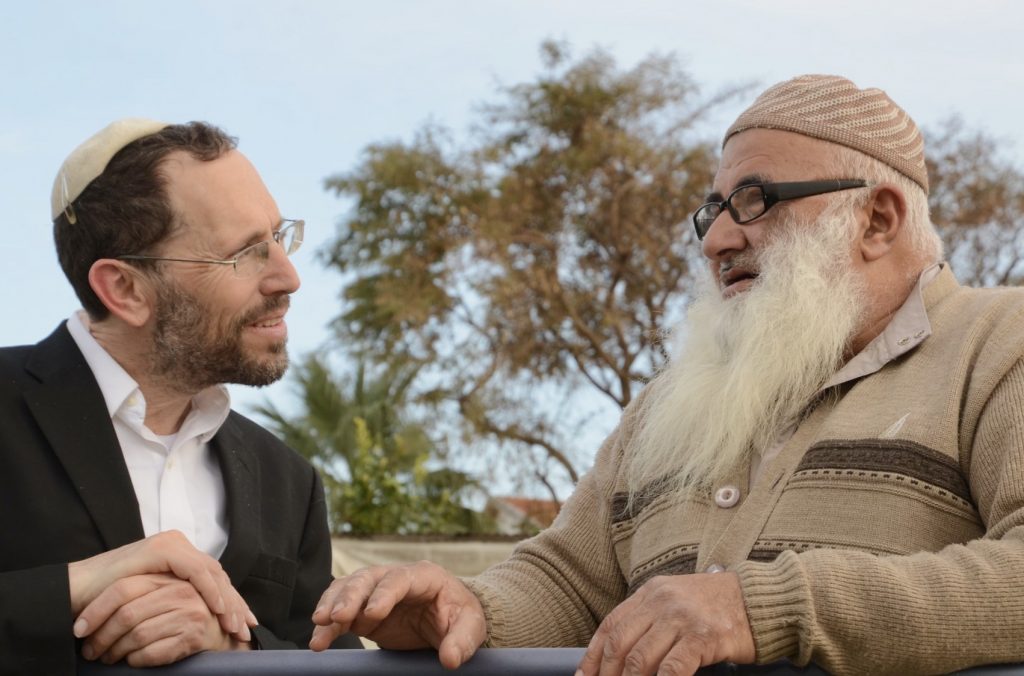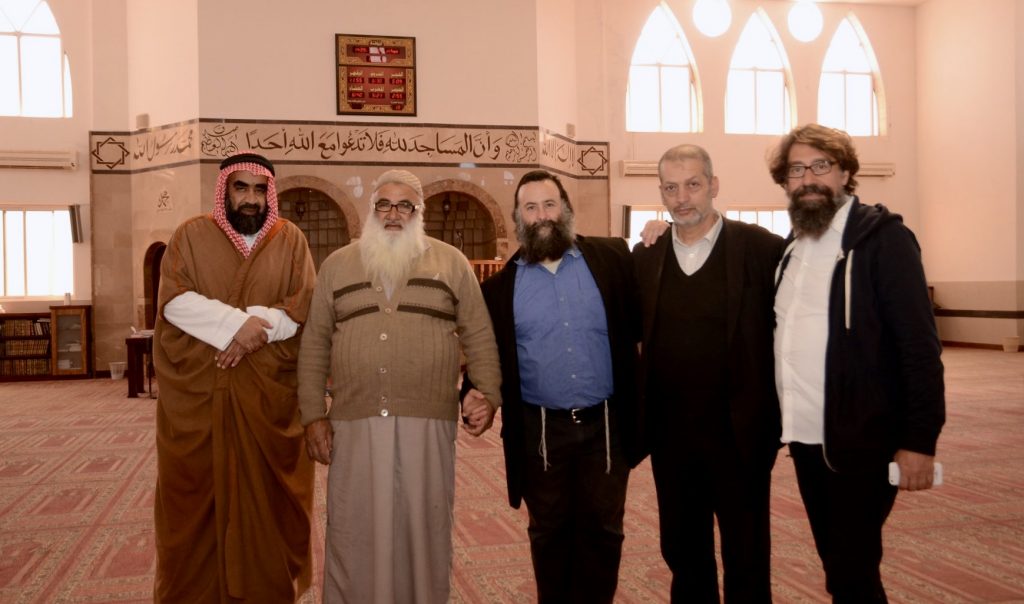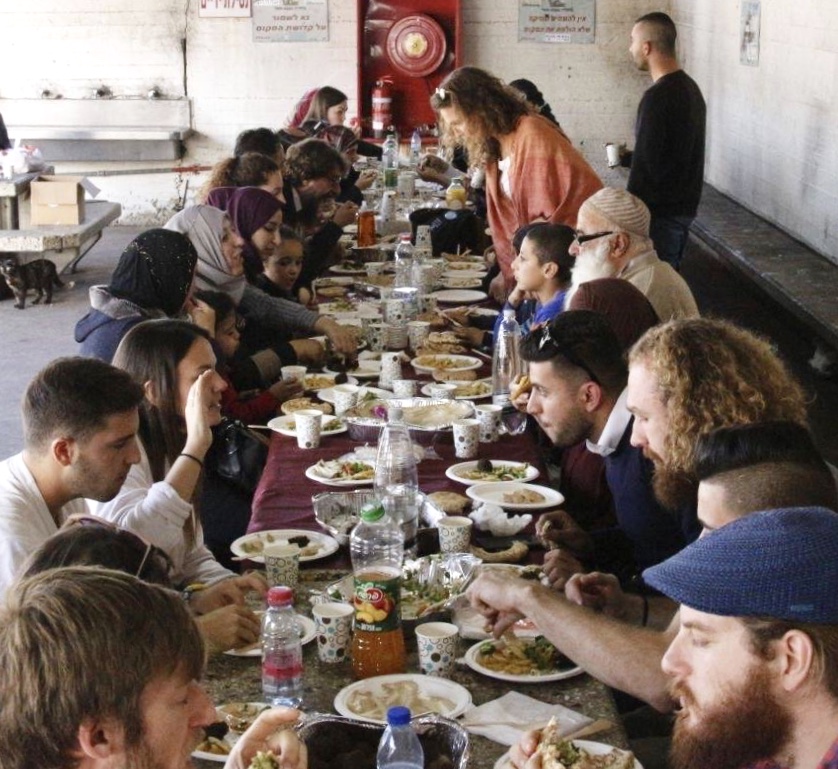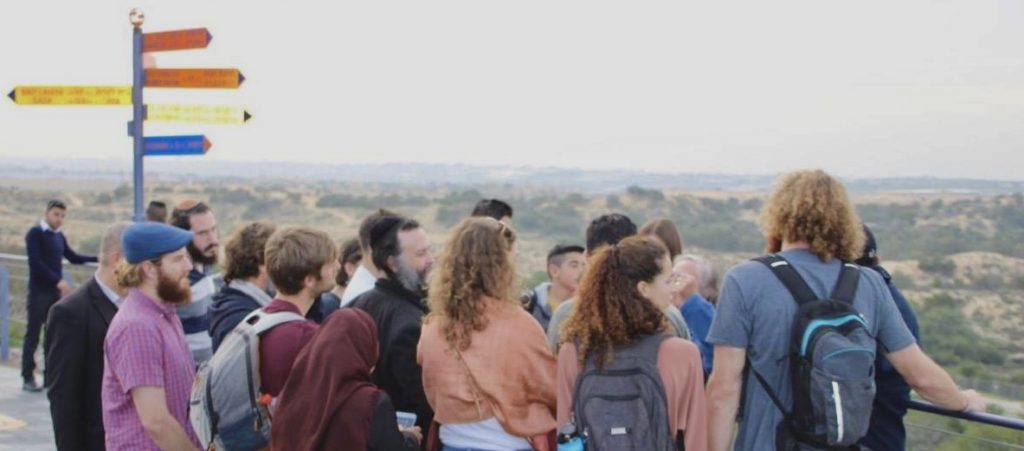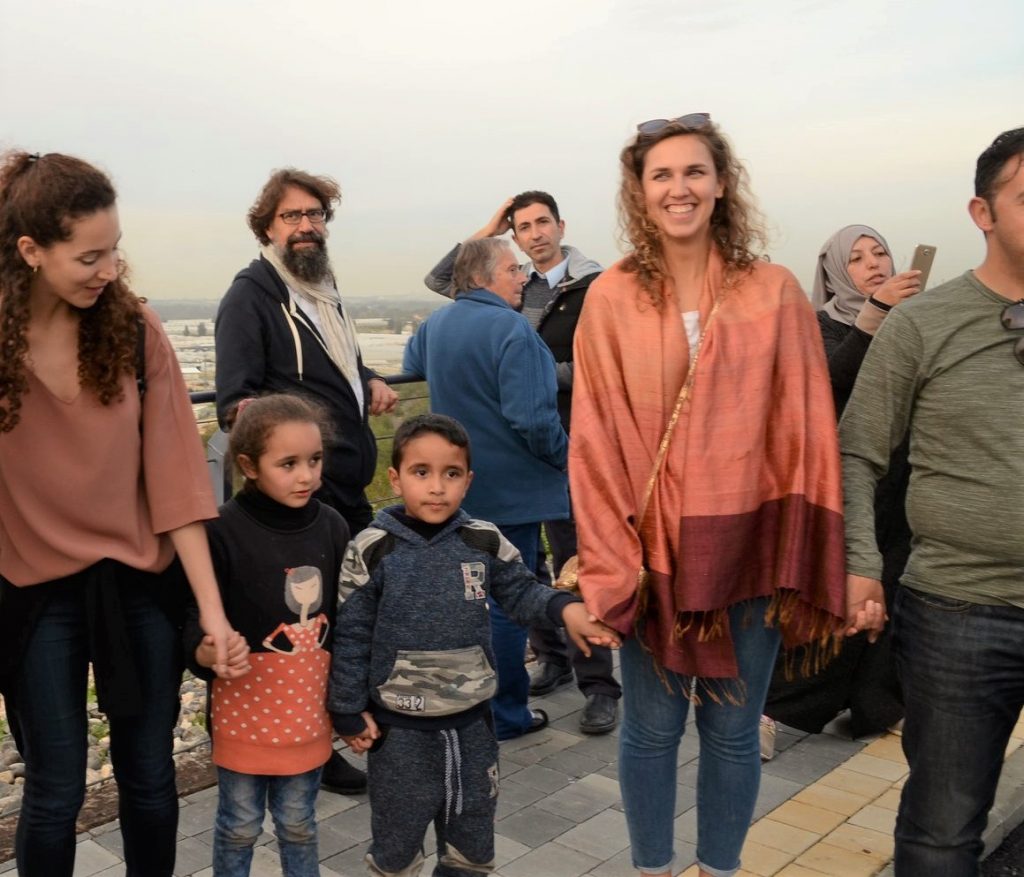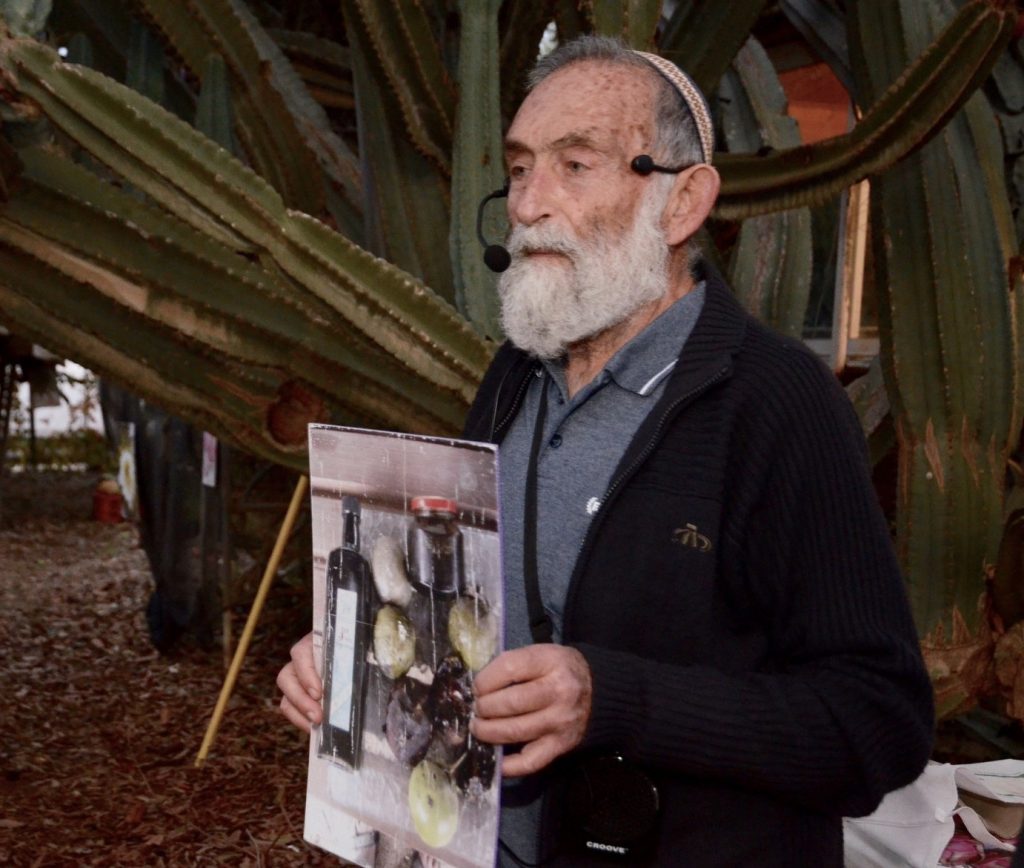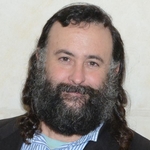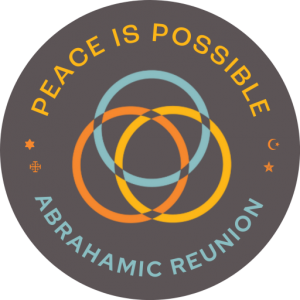Israel Director
On February 4th, 70 people joined the Abrahamic Reunion South journey to meet religious, peace and ecology leaders in communities in the Negev and Gaza border region. Joining us were Jews, Christians and Muslims, rabbis and sheikhs, men and women, including Palestinians from East Jerusalem, Nablus, Jericho, Bethlehem and Hebron, Israelis from Jerusalem, and the Negev, and students from an international conflict resolution course at Tel Aviv University. The event was in honor of World Interfaith Harmony Week, and in observance of ‘TuBishvat’, the Jewish ‘New Year of the Trees’ holiday.
The day began with a welcome by Sheikh Tared Atouna, the Imam of the Bedouin city of Hura, to his town, meeting us in the community center. Sheikh Atouna shared with us many interesting facts about Hura. The town, on 1967 border near Hebron, is one of the “planned” Bedouin cities in southern Israel with a population of 30,000, and part of the Negev’s Bedouin population of 300,000. The Sheikh exclaimed, “Everyone has it wrong, Hura is NOT IN THE SOUTH of the country, but in fact is the true geographic CENTER!” From Hura it’s exactly 250 kilometers south to city of Eilat and 250 kilometers north to Rosh Haniqra. Also, according to Muslim tradition, the ancient “Joseph’s Well” on the edge of their cemetery is the same pit that Joseph was thrown into by his brothers. The Muslims then prayed their mid day prayers. We ended our time in Hura with a visit to the impressive central mosque, and time at the viewpoint overlooking Beer Sheva and the whole region.
We then traveled to Netivot, where AR director Eliyahu McLean pointed out his home, and massive building that is transforming the thriving periphery town of Netivot. We then gathered for a shared meal outside the Tomb of the Baba Sali, the Moroccan Jewish ‘tzadik’, saint, one of the most visited Jewish holy places in Israel. Inside the tomb of the Baba Sali, Eliyahu shared stories of the life and family lineage of the famed Rabbi Yisrael Abuhatseira, who was revered by both Muslims and Jews during his lifetime in Morocco, and whose grandfather’s, the ‘Abir Yaakov’, gravesite in Egypt is still revered today by Muslim Egyptians. The Jews among us joined the mid day ‘mincha’ prayer. An older Moroccan Jewish woman spoke to the Muslim women with us from Nablus and East Jerusalem in Arabic, saying, “In Morocco we Jews and Muslims used to live by side as friends and good neighbors, let’s return to that!”
Then at the border lookout of the Israel-Gaza border in the village of Nativ Ha’asra, we were welcomed by Roni Kedar. Roni is active in the Israeli NGO “Another Voice,” organizing dialogue between Israelis and Palestinians in Gaza. At the lookout we could see a few hundred meters away the northern Gaza border wall, and into northern Gaza towns, including a Hamas military training center. Roni shared the hardship of living with fear of mortars falling, and of tunnels being dug underneath them. Joining our delegation were the wife and daughter of the late Sheikh Bukhari, Hala Bukhari grew up in Gaza, and her other daughter lives there now, as we looked further at the skyline where she lives in Gaza City. We learned of the siege and struggle for daily survival of the citizens of Gaza.
Our West Bank coordinators, Muhammad Jammous from Jericho and Evangelical Christian Daniel Aqleh from Bethlehem initiated a circle to pray for peace, and justice between our peoples. Sheikhs Muhammad Usta and Jamal al Din from East Jerusalem, and Rabbi Yaakov Nagen from Otniel led us in Islamic and Jewish prayers for peace. With the news headlines blaring that day was “95% chance of war between Israel and Hamas”, we exclaimed our intention that the opposite, peace, should break out.
Finally we arrived at the Gaza border town of Kfar Maimon, for a tour of the unique ‘Ora’s Orchard’. Host Reuven Rosenblatt spoke about their farm where they grow over 80 fruit species, including some that flower only at night, and others just once a year. Reuven shared also his remarkable story of escape with his family from a Nazi death camp in Poland. He showed us one of the gold coins his mother used to bribe prison guards with to postpone being sent to the gas chambers, and shared how a wealthy dentist bribed guards to allow him to hire Reuven’s father as his assistant, from where they planned the family’s escape to freedom. In Israel Reuven met his wife Ora, who lost all her family on a journey by foot to Israel from Yemen.
Eliyahu led a ‘Tu Bishvat”, Jewish New Year of the Trees ceremony, with rounds of blessings of different kinds fruits, with a transition from white to red grape juice. We streamed our event live to an interfaith gathering in the USA. The evening ended with a feast and prayer for peace between Gaza and Israel. Our host, Reuven, said, “Like in our garden where many diverse plant species live in harmony creating a Garden of Eden, so too can our diverse religious communities live in the Holy Land in harmony. Like all of us here together today, we create our own Paradise”.
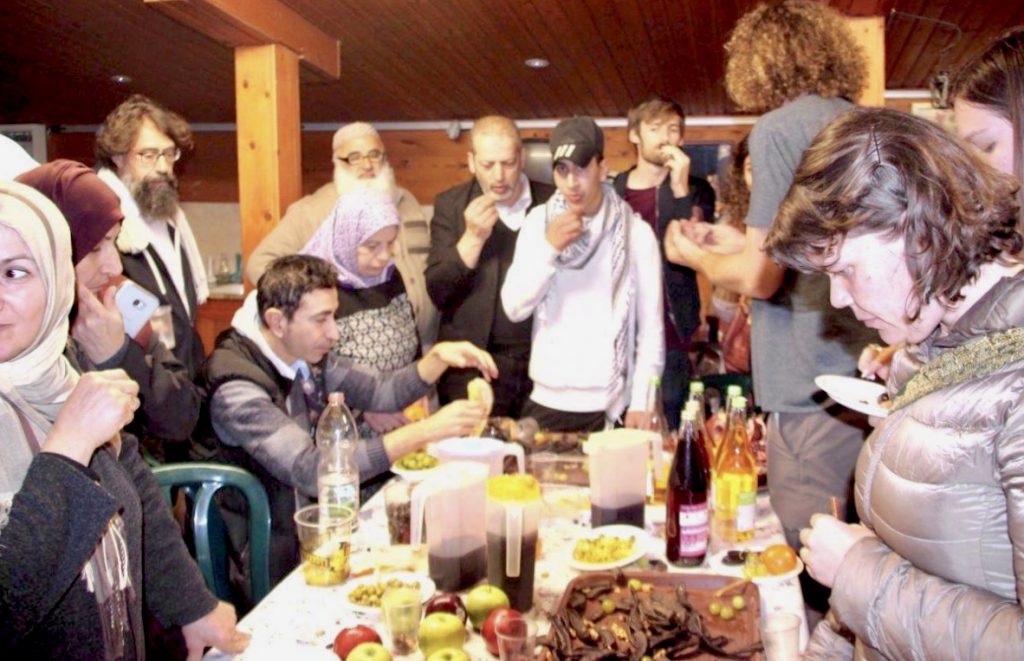
Muslims, Christians, and Jews celebrate TuBishvat together, sharing different fruits and grape juice
Rodef Shalom Eliyahu McLean is the Israel Director and a co-founder of the Abrahamic Reunion. He was ordained as a “Rodef Shalom” (Pursuer of Peace) by Reb Zalman Schachter-Shalomi. He runs twice weekly “dual-narrative” tours to Hebron from the Abraham Hostel in Jerusalem.

